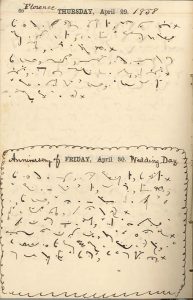 While working in Salt Lake City in 2011, I met a sort of expert in lost arts named LaJean Carruth. Besides being a weaver, she also taught a small class on nineteenth-century Pitman Shorthand,[1] which she invited me to join. Being a lover of lost arts myself, I naturally agreed.
While working in Salt Lake City in 2011, I met a sort of expert in lost arts named LaJean Carruth. Besides being a weaver, she also taught a small class on nineteenth-century Pitman Shorthand,[1] which she invited me to join. Being a lover of lost arts myself, I naturally agreed.
For those unfamiliar with Pitman Shorthand, Sir Isaac Pitman’s creation of a phonetic shorthand system in 1837 marked the beginning of one of the most lasting forms of shorthand, in use for well over a hundred years, particularly in Great Britain. With a variety of strokes to indicate consonants and interspersed dots and short dashes representing vowels, it was primarily used for its speed and ability to conserve space.[2] As a result, many records from the mid-1800s are written in Pitman Shorthand.
However, the system has undergone a variety of changes since it was first introduced, so even those trained to read modern-day Pitman shorthand can find reading the nineteenth-century version a challenge. But with LaJean’s training, another student (Silvia Ghosh) and I soon began transcribing the diary of a man named Herman Veeder (13 July 1830–27 January 1896),[3] who lived in Florence, Nebraska, in the late 1850s and kept a shorthand diary 1 January–14 September 1858.[4] In an almost forgotten language, we discovered a surprisingly detailed and often candid record.
In his diary, Herman writes about everyday occurrences: “tinkering” around his sitting room; [5] going to parties with his wife, Hannah (Adair) Veeder (31 July 1834–24 October 1872),[6] who was pregnant with their first child at the time; [7] and dealing with business at the office and chores around the house.
But he also writes more intimately of his life with Hannah. In February, after an evening out, he notes, “When we got home, [Hannah] had great hysteria, which alarmed me, for a while, but I will know another time how to manage it better.”[8]
Despite this small trial, there seems to have been a great deal of affection between Herman and Hannah, whom he occasionally referred to as his “little wifey,” an evident term of endearment: “At about noon, I was rejoiced by the arrival of my ‘little wifey,’ whom Mr. McLane brought up, after just 3 days business. She had a perfect triumph at the concert [in Omaha], and was most vociferously ‘encored’.”[9]
On their one-year anniversary, Herman notes, “Just one year ago tonight, I had the great happiness of claiming my own little Hannah, before the world as my wife. That union has thus far proved a blessing to us both, and we are now better satisfied than ever, that we are truly mated.”[10]
But if all was well between Herman and Hannah, things were not quite as well with his friends the Parkers. In late March, while on a visit to their house, Herman notes that his friend “McLane and Mrs. Parker met upstairs, this afternoon, by stealth, and came very near getting themselves and me into trouble as Mr. Parker came near catching them, but McLane got away without Parker knowing he had been up.”[11] What else went on between Mrs. Parker and McLane is a bit of a mystery, but in June, Herman “wrote part of [a] letter to Mrs. Parker declining any further share in the intrigue between herself and McLane.”[12]
That such a candid record describing both marital affection and more scandalous affairs exists to this day is delightful. One wonders if the somewhat enigmatic quality of shorthand allowed Herman to be a little freer in expressing himself than if he were writing in longhand, which almost anyone could have read. Perhaps this freedom was another benefit of shorthand?
Notes
[1] For more information on the history of shorthand systems, see Zachary Garceau's 3 October 2016 blog post.
[2] Isaac Pitman, A Manual of Phonography, or, Writing by Sound: A Natural Method of Writing by Signs that Represent Spoken Sounds: Adapted to the English Language as a Complete System of Phonetic Shorthand (London: Fred Pitman; Bath: Isaac Pitman, 1857), 9–10, 23, 27.
[3] National Archives and Records Administration (NARA), Washington D.C., Passport Applications, 1795–1905; Roll #: 232, 17 November 1879; Obituary, The Plattsburg Press, Plattsburg, N.Y., 25 February 1896, p. 3.
[4] Herman Veeder, Diary, 1 January–14 September 1858.
[5] Veeder, Diary, 1, 3, 5, and 28 January 1858, pp. 1, 2, 3, 14.
[6] 1850 U. S. Census, Ohio, Allegheny, Pennsylvania, 382B; 1870 U.S. Census, Plattsburgh, Clinton, New York, 509B, accessed online at Ancestry.com; Obituary, The Plattsburgh Sentinel, Plattsburgh, N.Y., 1 November 1872, p. 3; Veeder, Diary, 4 January 1858, p. 2.
[7] Veeder, Diary, 11 June 1858, p. 81.
[8] Ibid., 6 February 1858, p. 19.
[9] Hannah was apparently a musician or singer. Veeder, Diary, 18 March 1858, p. 39.
[10] Ibid., 30 April 1858, p. 60.
[11] Ibid., 24 March 1858, p. 42.
[12] Ibid., 23 June 1858, p. 87.
Share this:

About Amanda Owens
Amanda served as lead editor on the Documents series of The Joseph Smith Papers in Salt Lake City. Prior to that, Amanda spent nearly four years as a project editor on math and science curriculum at Glynlyon, Inc., in Chandler, Arizona. She has an M.A. and a B.A. in English Literature from Arizona State University, with emphases in linguistics, children’s literature, and early Romantic British Literature. She also reads nineteenth-century Pitman shorthand and helped transcribe and annotate a number of shorthand journals from the mid- to late 1800s.View all posts by Amanda Owens →